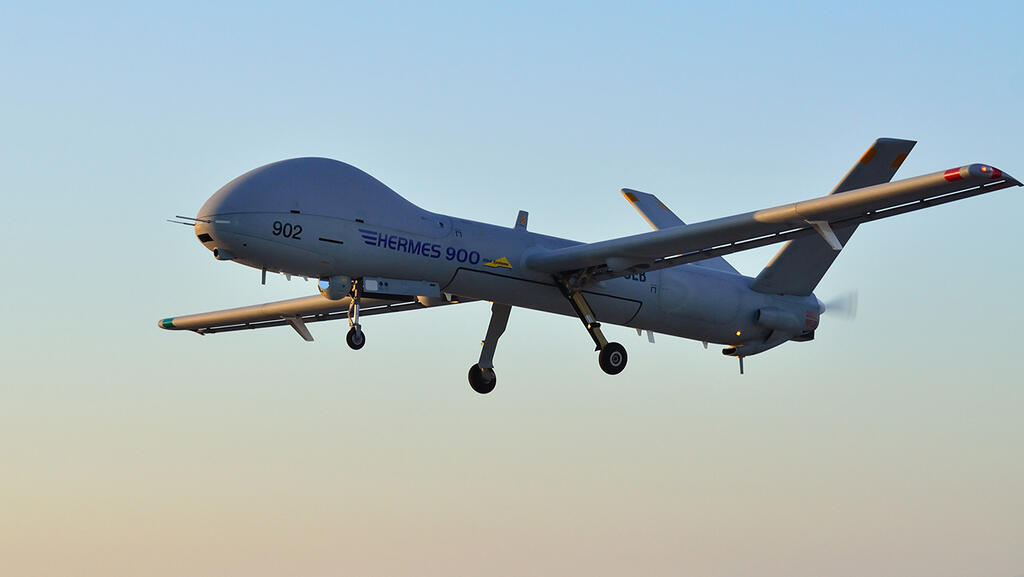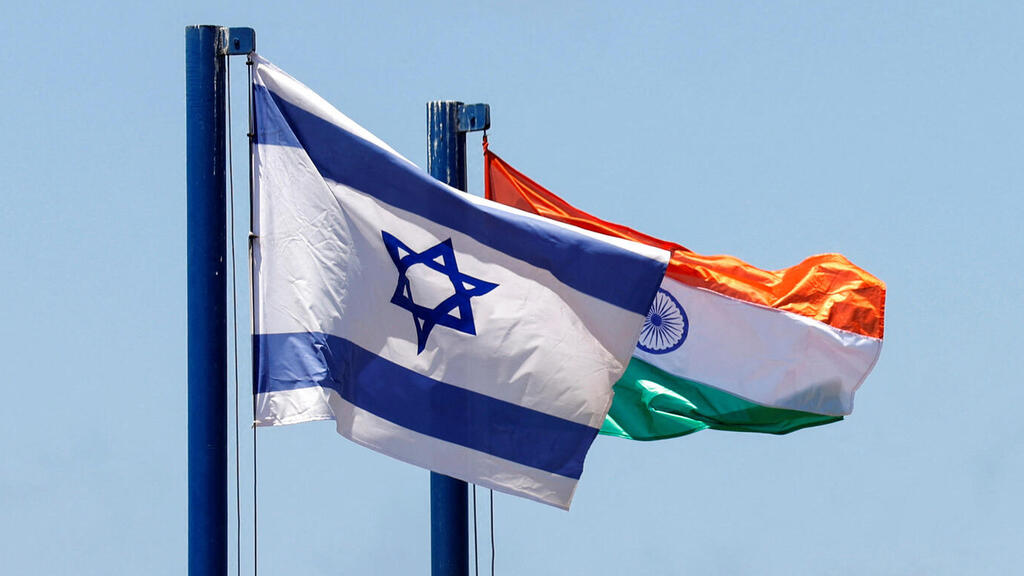Getting your Trinity Audio player ready...
Back in May, Spanish authorities prevented the Marianne Danica cargo from docking at the port of Cartagena on its way to Israel. The ship, originating from the city of Madras in India, was carrying 27 tons of munitions destined for the IDF, against the backdrop of the war with Hamas in Gaza and Hezbollah on the Lebanon border. The incident highlights the fact that India has been providing significant military assistance to Israel since October 7.
In February, Indian media reported for the first time that India was supplying Israel with advanced Hermes 900 drones manufactured in the city of Hyderabad. The report said the factory, established by Israel to supply these drones to the Indian military, converted 20 of them specifically for the IDF due to the shortage created during the war.
4 View gallery


Prime Minister Benjamin Netanyahu and Indian Prime Minister Narendra Modi
(Photo: AFP)
The factory, a joint venture between the Israeli defense company Elbit Systems and the Indian billionaire Gautam Adani’s consortium is the first in the world to produce these drones outside of Israel.
This dramatic decision was likely approved by the highest officials in India, likely due to Israel being one of its main arms suppliers to the country. The move joins other reports indicating India has supplied Israel with artillery shells and weapons since the start of the war. The strategic partnership between the countries has proven highly beneficial for Israel.
"The Indians always remind us that Israel was there for them during the Kargil War," says Daniel Carmon, former Israeli ambassador to India, referring to India’s military conflict with Pakistan in the summer of 1999. "Israel was one of the few countries that stood by them and provided them with weapons. The Indians don’t forget this and might now be returning the favor."
The war in Gaza put the relationship between Israel and India to a tough test, one that many allies failed to pass. During the first hours of October 7, Indian Prime Minister Narendra Modi posted his support for Israel and unequivocally condemned terrorism. Once he set the tone, his country showed unconditional support for Israel in the first few months.
This unequivocal stance slightly shifted as India entered campaigns for the country’s election held at the beginning of the month, partly because nearly 15% of its citizens are Muslim. The government's public policy didn’t revoke support from Israel, but two elements were added to official statements.
The first is support for a two-state solution in line with India's consistent position over the years (India has recognized a Palestinian state since the Cold War). The second is calls for increasing humanitarian aid to Gaza, including sending its own supplies.
Indian government officials refrained from saying anything negative about Israel in the last eight months, while the opposition harshly attacked it. Protests took place across India, particularly in the state of Kerala, where governor Pinarayi Vijayan, leader of the Communist Party, took a hardline stance against Israel and even participated in a protest in Delhi. Senior Hamas official Khaled Mashal even participated in one of the protests.
Behind the scenes, India blocked or mitigated decisions against Israel in international forums such as the Non-Aligned Movement and BRICS (which includes Russia, China, Brazil, and South Africa, all hostile toward Israel).
However, as the war dragged on and anti-Israel sentiment grew, India realized it was paying a heavy diplomatic price. It did not block the latest decision against Israel in the Non-Aligned Movement because it could not find another country to join it as required. At this point, the Indians announced: Enough, we have our own interests too. Israel did not protest, understanding the sensitive situation.
Generally, India abstains In UN votes against Israel. It also blocks decisions against Israel in international forums such as the Non-Aligned Movement and BRICS (which includes Russia, China, Brazil, and South Africa, all hostile towards Israel). However, as the war dragged on and anti-Israel sentiment grew, India realized it was paying a heavy diplomatic price, and began aligning itself with the rest of the West.
Public sentiment toward Israel in India is also not unequivocal. Social media is filled with expressions of support for both sides, and pro-Israel rallies have been held occasionally. The media is heavily critical of the war, partly because there are no Indian correspondents in Israel, and news outlets rely on foreign agencies, but supportive articles about Israel are also published.
4 View gallery


Former Iranian president Hassan Rouhani and Indian Prime Minister Narendra Modi
(Photo: EPA)
India is a country afflicted by terrorism, and this shapes its perspective on events in Israel. Even if no one declares it publicly, supporters of the Indian government are praying for Israel's success because the fight against terrorism is a common foundation for their relationship.
However, it's important to remember another point: India still maintains close relations with Iran. A recent agreement the two countries signed allows India to upgrade the port of Chabahar in Iran, allowing goods to be transported to Afghanistan and Central Asia, bypassing its rival Pakistan.
In March, India's National Security Advisor Ajit Doval visited Israel and discussed regional developments with Prime Minister Benjamin Netanyahu. This was the only visit made by a senior Indian official to Israel since the outbreak of the war, despite Israel's desire to host a larger solidarity visit.





